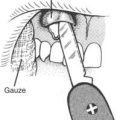STROKE
A stroke is caused by a blood clot that blocks an artery supplying part of the brain, or by bleeding from a leaking vessel into the brain. It occurs suddenly and can be minor or major, depending on the area and amount of the brain involved. If a stroke involves the brainstem, it may affect the breathing center and cause rapid death. A stroke may be caused by rupture of a cerebral artery aneurysm; when this occurs, the victim may suffer from a form of bleeding known as subarachnoid hemorrhage, in which case the victim typically complains of the “worst headache of my life.”
Symptoms include sudden headache without another cause; numbness of the face, arm, or leg; nausea and vomiting; blurred or double vision; weakness or paralysis of the arm(s) and/or leg(s) (particularly if it occurs on one side); difficulty speaking or understanding speech; difficulty walking; dizziness, confusion, and/or loss of balance or coordination; loss of consciousness; coma; seizure; and collapse. If someone has stroke symptoms that last for a few minutes to an hour and then gradually resolve, he has suffered a transient ischemic attack (TIA), which is a warning that he may soon suffer a full-blown stroke. Even if stroke symptoms are fleeting, the victim should see a physician as soon as possible. If a person is believed to have suffered a TIA, he should begin to take aspirin, 50 to 325 mg by mouth once a day, until he is evaluated by a neurologist. If a stroke occurs, aspirin should not be administered.
Mental status. Ask the victim his name, age, and location, as well as time, day, and year.
Vision. Have the victim count fingers that you display. Check each eye by itself and then both eyes together. Check that the pupils are equal. Ask the victim to follow a moving object with his eyes.
Facial muscles. Ask the victim to pucker his lips, and then to whistle. Check the cheeks and mouth for symmetry. Have the victim clench his jaw while you feel the jaw muscles on each side. Have the victim tightly close his eyes. Have him relax with his eyes closed; lightly touch his face to locate any numb spots.
Hearing. Make a soft noise (yet loud enough that you can hear it) in each of the victim’s ears.
Swallowing and speech. Ask the victim to swallow. Ask him to stick his tongue out and move it from side to side voluntarily. Listen carefully to note if his speech is clear or slurred.
Muscle strength. Have the victim squeeze one of your fingers with each hand, straighten each leg against resistance, bend each leg against resistance, bend and straighten each elbow and wrist against resistance, extend and flex each ankle against resistance, and shrug both shoulders against resistance.
Sensation. Using a light touch, move your fingers over the entire body and try to identify any areas of decreased sensation.
Coordination. Ask the victim to stand perfectly still in an upright position with his eyes closed and his arms at his sides. Be prepared to catch him if he begins to fall. Have him open his eyes, and then clap one hand into the palm of the other as fast as possible. Ask him to move an index finger back and forth between the tip of his nose and your finger, held 18 in (46 cm) away. Have him walk heel-to-toe and on tiptoes.
If someone displays the symptoms of a stroke, he should be placed at absolute rest with his upper body and head elevated by an angle of at least 30 degrees. If his level of consciousness declines, pay attention to his airway (see page 22) so that he does not vomit and choke. Seek immediate medical attention. Low blood sugar may cause symptoms that mimic a stroke. If the victim can swallow purposefully without choking, sugar granules or concentrated liquid glucose (Glutose: one tube contains 25 g) can be inserted under the tongue, to dissolve and be passively swallowed (see page 142).
If stroke symptoms are associated with scuba diving, they might indicate an air embolism (see page 401). In this case, the victim needs to be transported in a head-up and/or left-side-down position and delivered to a recompression (hyperbaric) chamber as soon as possible.




